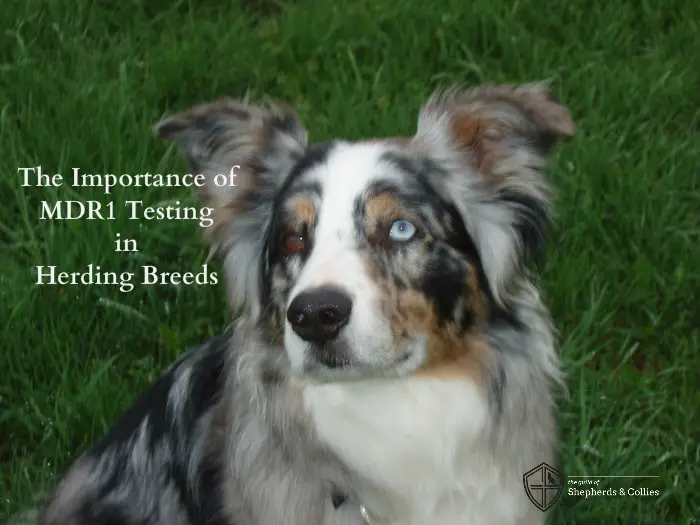MDR1 and Your Herding Dog
The Importance of MDR1 Testing
There has long been a saying “Don’t give ivermectin to your white-legged herding dogs.” That was in place way before anyone knew why that statement was good to follow. We now know that the problem with many herding dogs and herding dog mixes (not just those with white legs), and ivermectin is due to a genetic defect – a mutation of the MDR1 gene.
MDR stands for Multi-Drug Resistance, but “sensitivity” is a more accurate description of the problem. Dogs with this mutation have a “leaky brain” so drugs that normally would be shut out or quickly removed, get into the brain and stay longer than they should. The defect involves a drug transport protein. Ivermectin has been the poster child drug for the problem, but there are now additional drugs known to cause problems. Current drugs on the list are:
- Acepromazine
- Loperamide
- Butorphanol
- Milbemycin
- Doramectin
- Moxidectin
- Doxorubicin
- Paclitaxel
- Erythromycin
- Selamectin
- Ivermectin
- Vinblastine
- Vincristine
As you can see, this is a diverse group of medications – dewormers, antibiotics, antidiarrheals and chemotherapy drugs. Some of these drugs can be used safely in dogs with the mutation at low doses. For example, the heartworm medications that include ivermectin can be used in affected dogs but you MUST follow directions and dosing guidelines exactly.
Which Herding Breeds Are At Risk?
Many herding breeds are listed by Washington State University for the MDR1 mutation. Also included are some breeds developed with herding breed crosses. Collies (no differentiation between Rough and Smooth) have a 70 percent prevalence of the gene – meaning 70 percent of all Collies have at least one copy of the mutant gene. Australian Shepherds and Miniature American Shepherds come in second with a 50 percent prevalence. Shetland Sheepdogs and English Shepherds both have prevalence rates of about 15 percent. Border Collies and Old English Sheepdogs have about a 5 percent incidence. It was originally felt that only dogs from the United Kingdom had the mutation, but German Shepherd Dogs have a 10 percent incidence.
This genetic problem is inherited as a simple dominant/recessive. In can affect both males and females equally. If you breed two homozygous normal dogs (Normal X Normal) you will only get normal puppies. These puppies can be certified as Normal via parentage. If you breed a Normal homozygous (Normal X Normal) to a mutant heterozygous (Normal X Mutant) you will get a mix of normal and heterozygous pups. If you breed two mutants, all pups will be affected mutants. If you breed two heterozygous dogs you can get homozygous Normal, homozygous Mutant or heterozygous pups.
MDR1 and Toxicity
Dogs who have the mutation and become toxic may show a variety of symptoms. Depression, drooling, vomiting and lack of appetite are common. Dogs may act disoriented and be temporarily blind. Tremors or seizures are often noted. The dog may fall into a coma. Dogs can and do die from this.
As herding dog owners have become more aware of the problem, they are having their dogs tested and using caution around any of the listed drugs. Dogs can be tested via a blood sample drawn by your veterinarian or cheek swab from a kit you order yourself from Washington State University (see link above). This is especially important if you plan on breeding your dog, but could also be important information for planning medical care for your individual dog. For example, if your dog needs chemotherapy, knowing his MDR1 status can help you to plan a safe protocol for treatment.
Many cases of toxicity come from dogs accidentally getting into horse dewormer. If your horse spits out his apple flavored paste dewormer that has ivermectin and your dog licks it up, your dog may be poisoned. The same is true if dogs eat manure from horses who were just dewormed as some medication passes through intact. Ideally keep your dog away from any manure for at least 48 hours after horses have been treated. Don’t attempt to use large animal versions of dewormer for your dog – getting the dosage correct can be difficult and it is easy to overdose dogs with these medications.
Article By:
Deb M. Eldredge, DVM
Meet Our Evangelist








